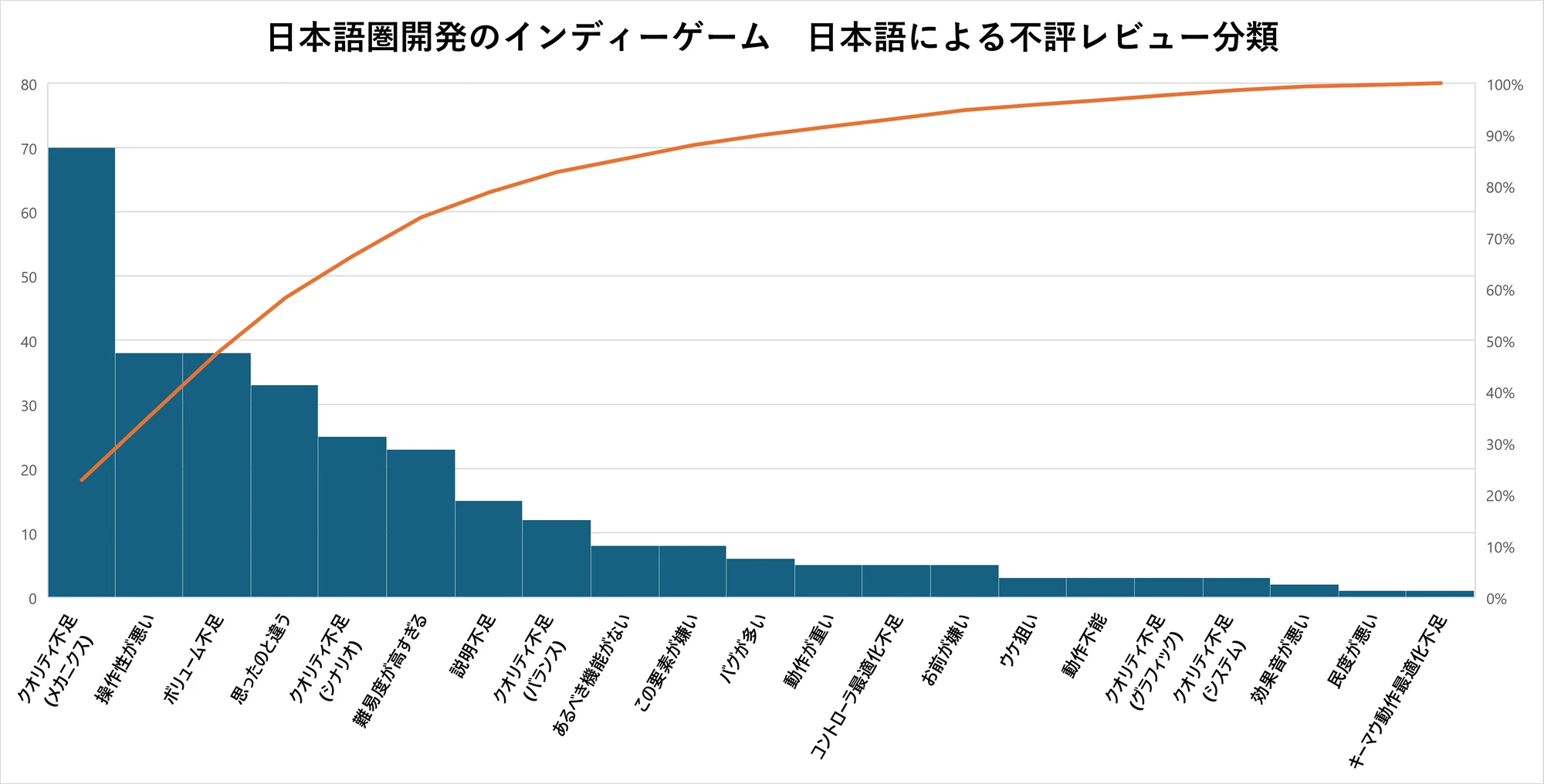1
https://note.com/sheeplane/n/n6578135df995 [https://note.com/sheeplane/n/n6578135df995]
One of the recurring topics of discussion among Japanese devs of all sizes is the notion that Japanese audiences are particularly prone to leaving negative or harsh reviews of games online, coupled with the more recent concern about the rise of ironic shitpost reviews and how they may or may not be jeopardising devs' chances of hitting the Overwhelmingly Postive (95%) review threshold on Steam.
Naturally, a lot of these discussions tend to be very emotive/speculative and don't really offer a lot of data or analysis thereof, so indie dev SheePlane [https://twitter.com/K_SheePlane/status/1753692126159028446] (developer of the fun mecha action game Punihi Loader 2 [https://store.steampowered.com/app/1956960/PUNIHI_LOADER_2/], recently released via Early Access) decided to do some digging: they grabbed 200+ negative reviews from ~30 unnamed JP indie games across various genres, each released from 2022~24 and with sales in the four-to-five-figures range, and classified them by the specifics of their complaints in order to identify the most common kinds of negative reviews, as well as checking the word frequency of the reviews in order to discern the motivations behind leaving negative reviews in the first place. (The average review size was 360 characters, btw, so a few twxxts long.)
I don't have time for a full translation right now, but here's a summary:
----------------------------------------
These were the most common complaints cited in negative reviews, in descending order from most frequent (as displayed on the attached chart):
* ""lacking in quality (game mechanics)": a lot of these reviews could broadly be categorised as "boring/not interesting", but the author felt they ought to break them down into specifics; a lot of the cited criticisms include fundamental misunderstandings of particular genres; games with intriguing aesthetics that don't have the gameplay to back them up; games with low replayability or meaningful player choice; games with too much randomness; etc
* "poor controls": pretty straightforward: input delay or other unresponsiveness/poor gamefeel; lack of optimisation/support for controllers and/or kb&m, etc
* "lack of content": again, very straighforward: perceived poor value for money, simply not long enough, neat but not sufficiently fleshed-out, etc
* "it wasn't what I expected": complaints from people who expected genre x but instead got genre y, or whose impression of the actual game was very different from the one created by the store page media, etc; in other words, people who felt deceived or misled about what they'd purchased
* lacking in quality (story/plot): "the graphics aren't done justice by the story", "dull", "terrible denouement", etc; the author notes that the reviews in this category were particularly harsh, and posits that games without explicit action or decision-making systems are singled out for these elements in lieu of others (and that action games are virtually never criticised for substandard story/plot)
* "too difficult": the game was simply too hard to beat; gave up because it felt unfair; sudden difficulty spike right at the end; etc. The author gets the impression that most reviews are written by people aiming to clear and/or max out achievements on a given game, and that certain games attract fans who aren't savvy to a particular genre and thus struggle from that angle; they also noted that reviews complaining about low difficulty are quite rare.
* "insufficient explanation": the game simply doesn't explain itself, and people lose interest when they can't figure out what to do or what it wants from them
* "low quality (balance)": interesting mechanics ruined by poor balance; lack of variety in builds and/or obvious optimal choices that make the game feel monotonous, etc
* "lacking core QOL features": no autosave; no map; no ability to skip dialogue; missing core options, etc
* complaints about specific game elements: basically including little genre bugbears or tropes that fans dislike can trigger negative reviews; the author notes that horror games seem to get a lot of criticism along these lines
Some observations about certain other categories:
* "low quality (graphics)": There were virtually no criticisms about graphical quality, and the ones that they did note were more along the lines of people not liking certain visual/aesthetic choices than actual quality; the author reckons that maybe people simply don't buy games they think have low-quality graphics and thus don't review them
* shitpost-y reviews fishing for likes: Of the 218 reviews they went over, only 3 (1.6%) could be said to fall into this category, so based on this data, the odds of a dev getting a review like this and having it knock them out of contention for Overwhelmingly Positive are extremely low (but maybe that'd be different for games with a larger volume of reviews)
After doing a word frequency analysis, these words/phrases were most frequent among negative reviews:
* "(not) recommended", 50 mentions
* "stress", 41 mention
* (lack of) explanation, 32 mentions
* "disappointment", 24 mentions
The author makes two observations: one, players have a certain stress threshold that, when pushed by games that don't explain themselves, have cumbersome UIs, poor button response, will be crossed and lead to negative reviews; and two, Japanese players seem more commonly motivated to write reviews from the perspective of endorsing or disendorsing games for and on behalf of their communities, hence the focus on recommendations (but they do also note they'd have to actually test EN reviews to know for sure).
In their takeaway section, the author acknowledges that obvious elements like controls and game content/volume are worth addressing but not necessarily within reach of every indie dev, so their analysis of these reviews suggests indies should keep these key points in mind in order to keep negative reviews to a minimum:
* avoid imparting undue stress on the player, ie make sure your game offers sufficient explanation to the player, has a helpful UI etc (and keep in mind that if you focus too much on these elements, it may be at the expense of the quality and volume of the core game)
* accurately explain/portray your game on the store page: word-of-mouth, reviews, articles etc all drive interest in the game but screenshots, trailers, etc are also vitally important, so if your own media doesn't sufficiently or accurately profile your game, or simply isn't compelling, then people will feel more inclined to leave harsh reviews—wanting to create a sense of mystery or leave the viewer wanting more is one thing, but accurately conveying the appeal of the game is what matters
* understand and follow the conventions of a given genre: no game exists in a vacuum and players are naturally going to have certain expectations of your game based on well-established genre conventions, and neglecting obvious aspects (like, say, dialogue navigation/logs for novel-type games, or not offering WASD for a FPS) is enough to attract negative reviews, so do your homework and reduce as much immediate friction as possible
The author wraps up by saying that these are merely ideas about safeguarding against negative reviews and don't offer any sort of path towards creating or presenting a game people will get excited about and buy, or identify the elements that make a game attractive—if you want that Overwhelmingly Positive rating then you will want to be mindful of the pitfalls identified here, but that's not something you can or should attempt to engineer too thoroughly.
They were motivated to compile all this data due to all the discussions that happen online that only ever share positive/negative rations or basic review numbers without ever delving into the actual content of the reviews, and they'd like to see similar analyses for games in different contexts (EN and other languages, for example, or AAA games, or games with positive reviews, etc), so if anyone feels like taking it on, feel free to do so, and to share your results. (They also encourage people to keep leaving reviews—in their experience, Steam reviews are of a far higher quality than the typical review on Amazon, App Store, etc).



Uhh I’m not sure why it did that.